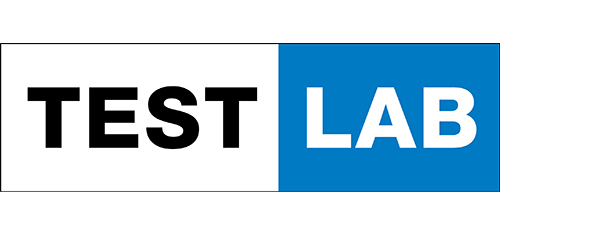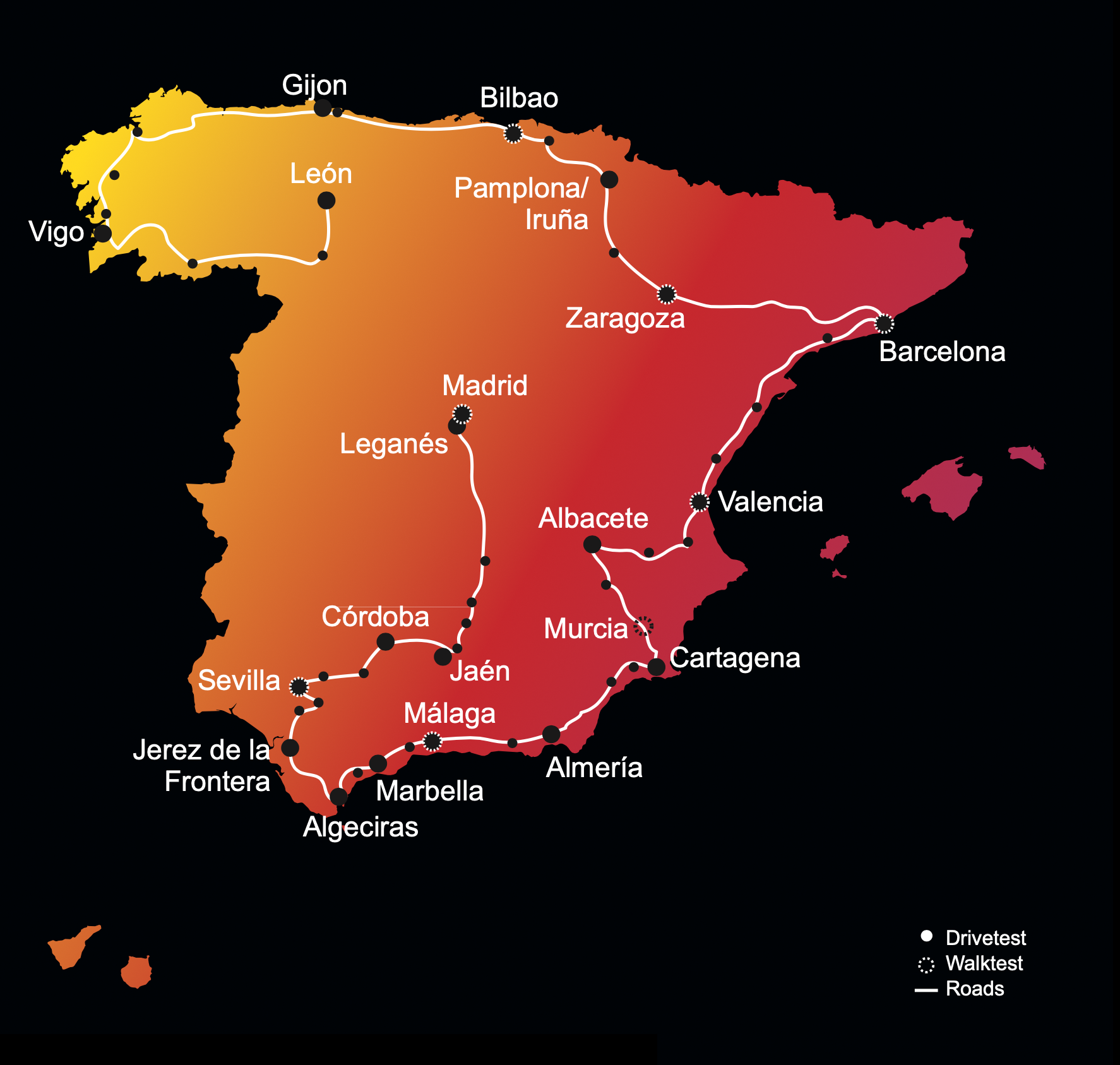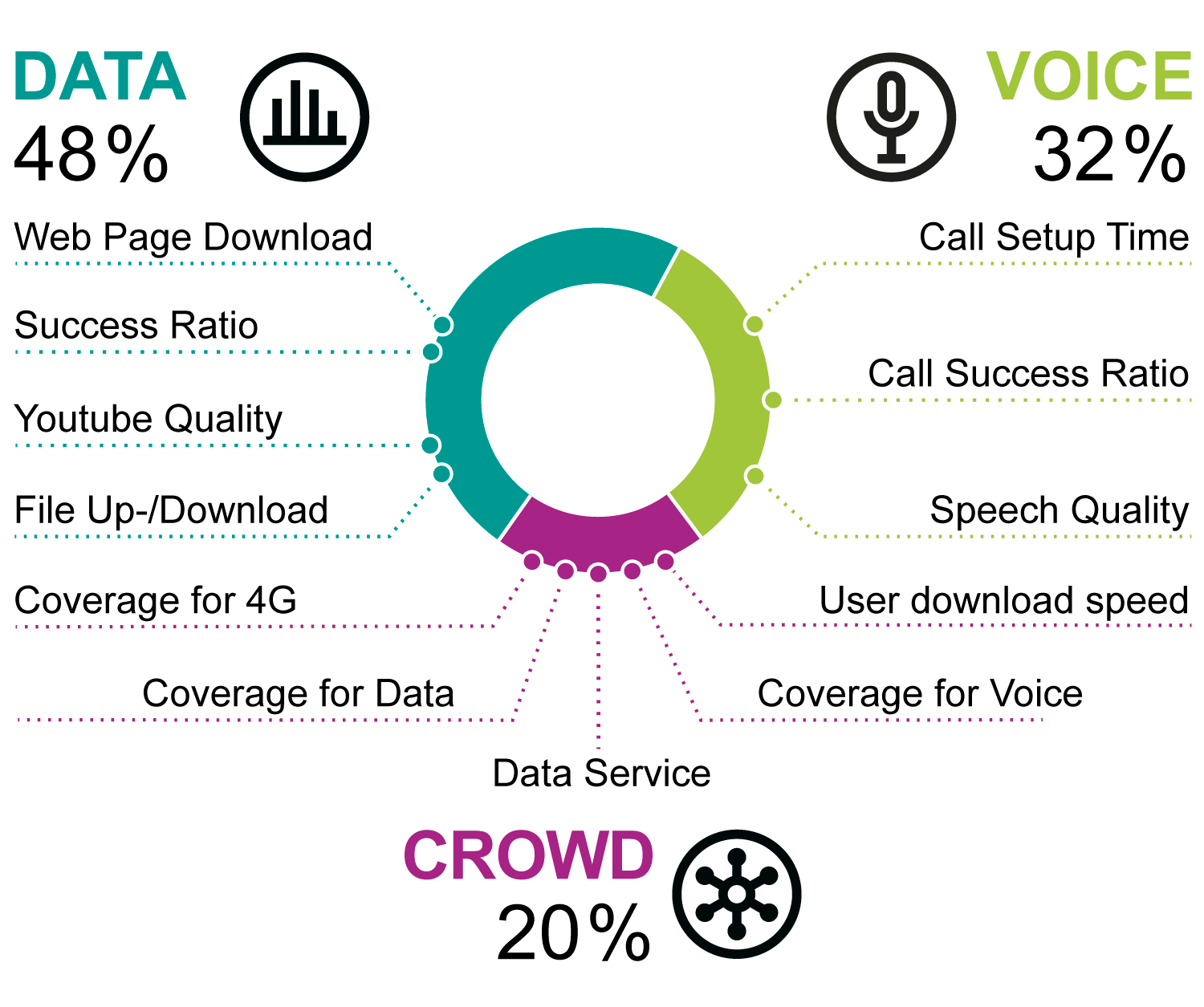Download English PDF version of the test here
Download Spanish PDF version of the test here
The 2020 Mobile Network Test in SPAIN
For the sixth time, the benchmarking expert umlaut and connect magazine have conducted their authoritative benchmark of the Spanish mobile networks. And, once again, we seized the opportunity to further enhance the underlying methodology.
While all operators in Spain strongly worked on expanding their 4G networks and on establishing their first 5G installations, we wanted to find out: Which contender offers the best performance and the highest reliability of mobile voice and data services?
KEY FINDINGS
Vodafone wins the umlaut connect Mobile Benchmark Spain for the sixth time in a row. Movistar follows with a gap of only three points and leads in the Data category. Orange ranks third and Yoigo fourth.
umlaut‘s network benchmarks are widely accepted as the de-facto industry standard and for being highly objective. The carefully designed methodology of our 2020 benchmark in Spain reflects umlaut‘s holistic approach to network benchmarking. Its benchmarks combine
drivetests and walktests to execute detailed voice and data measurements under controlled circumstances with a sophisticated crowdsourcing approach. This provides profound insights into the overall coverage of voice and data (with focus on 4G and 5G) services, real-world User Download Speeds and the Quality of Broadband Service. The drivetests and walktests allow for evaluating the maximum of the networks‘ capabilities. Crowdsourcing reveils the service quality and performance actually experienced by real users. We have thoroughly weighted these components in order to give a realistic and authoritative assessment of the rated networks‘ true potential and performance.
Even in the time of the Corona pandemic, our analyses showed that the networks remained stable, though with somewhat altered customer
usage patterns. When conducting this year‘s benchmark, we have of course carefully adapted the logistics to ensure maximum safety for our team members.
VODAFONE IS THE OVERALL WINNER,
MOVISTAR ACHIEVES HUGE SCORE IMPROVEMENT
Vodafone managed to continue its winning streak, scoring best in the umlaut connect Mobile Benchmark Spain for the sixth time in a row. The win is achieved by taking the lead in the Voice and Crowd-
sourcing categories. However, Movistar comes very close with a gap of only three points to Vodafone, showing a massive score improvement of 63 points compared to last year‘s result – mainly gained in the Voice category. In contrast, the other three contenders could not maintain their score levels from the previous year and have lost points. Also, Movistar is taking the lead in the Data category.
Orange falls back to the third position from last year‘s second rank and achieves the grade “good“ (2019: “very good“). Yoigo ranks last, falling back from 2019‘s “good“ to the grade “satisfactory“ this year. Still, Yoigo ranks second in the Crowdsourcing category, and together with Orange achieved the fastest crowdsourced user Download Data Rates.
Vodafone is the overall winner, with Movistar following at a close distance while impressively improving its score compared to our 2019 benchmark – achieving a plus of 63 points.
Orange ranks in the midfield with a good result,
Yoigo achieves the overall grade “satisfactory“.
SPAINS operators
The three largest Spanish mobile network operators are in constant competition for subscribers and market share. After having consistently increased their LTE coverage and speeds, now all four Spanish operators have also launched 5G installations in varying degrees.
Movistar is the brand name the Spanish telecommunications company Telefónica uses for the mobile network in its home market. Telefónica S.A. is one of the largest telco companies in the world. The operator is active in 17 countries with a total of 117,300 employees and achieved worldwide revenues of over €48 billion in its fiscal year 2019.
While the company introduced the Movistar brand in Latin American countries in 2005, it has been active in Spain since the launch of GSM services back in 1995. Today, Movistar is the largest mobile operator in Spain with approx. 19 million subscribers, which equates to a market share of over 30 per cent.
It offers GSM service at 900 and 1800 MHz, UMTS/ 3G at 900 and 2100 MHz and LTE at 800, 1800 and 2600 MHz. Movistar is supporting 4G+ carrier aggregation with maximum speeds reaching up to 1 Gbps. The operator claims to provide 4G coverage of more than 96 per cent of the Spanish population and has recently switched on 5G on 3500 MHz alongside refarmed 1800 and 2100 MHz frequencies, claiming to provide 5G signals to 75 per cent of the Spanish population by the end of 2020.
Orange España is the brand name of France Telecom‘s mobile network in Spain. It has been operating under this name since 2006. Previously, the network was known as “Amena“ – this brand name lives on in Orange Spain‘s portfolio as a low-cost offer that is only available via the internet. Also, its network serves a number of mobile virtual network operators such as MasMovil, Carrefour Móvil and others.
With approx. 16 million mobile customers, Orange is the second largest Spanish mobile operator with a market share of about 25 per cent. In the fiscal year 2019, Orange Spain reported a revenue of €5.3 billion which contributed approx. 13 per cent to the Orange Group‘s total revenue.
Orange Spain has deployed 2G networks at 900 and 1800 MHz, 3G networks at 900 and 2100 MHz and 4G at 800, 1800 and 2600 MHz. The operator claims that its 4G network reaches more than 97 per cent of the Spanish population. In 2020, Orange has launched 5G services on 3500 MHz in selected parts of the five cities Madrid, Barcelona, Valencia, Seville and Malaga and plans to expand it rapidly to other cities.
Vodafone España has been present on the Spanish mobile communications market since the year 2000. Then, the British Vodafone Group acquired Airtel Móviles which had operated in Spain since 1994. With approx.
14 million subscribers,
Vodafone has a share of about 23 per cent of the Spanish mobile market. This makes Vodafone the third largest operator in the country following at close distance behind its competitor Orange. In the fiscal year 2019, Vodafone Spain achieved revenues of €4.3 billion which contributes about 12 per cent to the whole Vodafone Group‘s financial results.
Vodafone‘s mobile network
in Spain offers GSM service at 900 and 1800 MHz, UMTS/3G at 900 and 2100 MHz and LTE at 800, 1800, 2100 and 2600 MHz. The Vodafone 4G network in Spain supports LTE 4 carrier aggregation (4CA or “4G+“) with maximum speeds of 1 Gbps.
Vodafone España claims to offer the best LTE coverage in Spain, reaching approx. 98 per cent of the Spanish population. The operator was the first to launch 5G in Spain and now operates 5G network cells on 3500 MHz
in 21 cities across the country.
Yoigo was the latest mobile operator to enter the Spanish market. Founded in 2000 under the name Xfera, the company started its actual operation in 2006, offering only a UMTS/3G network at 2100 MHz. At this time, the Swedish telecommunications company TeliaSonera acquired the majority of shares and rebranded the network as “Yoigo“. In June 2016, the former MVNO Másmóvil bought the company. For its fiscal year 2019, Másmóvil reported a record year with revenues of €1.7 billion and an increase of 1.4 million customers, resulting in now 7.4 million mobile subscribers or a market share of approx. 14 per cent.
Yoigo had a national roaming agreement with Movistar until the end of 2016. Since January 2017, Yoigo customers freely roam in the 2G , 3G and 4G networks of Orange at locations without Yoigo coverage. Yoigo operates 3G at 2100 MHz as well as 4G at 1800 MHz and 2100 MHz. Thanks to its roaming agreements, the operator claims an LTE coverage of approx. 98 per cent of the population. As the only Spanish operator, Yoigo currently does not support VoLTE. In 2020, Másmóvil has started to deploy 5G in 15 cities. Its further 5G roadmap is based on a combination of own infrastructure and an agreement with Orange.
A close look at Spain’s networks
The network benchmarks conducted by umlaut and connect are widely accepted as a completely objective authority. In 2020, we present the umlaut connect Mobile Benchmark Spain for the sixth time, with a further enhanced methodology
umlaut, based in Aachen, Germany, is a world leader in mobile network testing. The company was formerly known as P3 and changed its name
in fall 2019 in the course of restructuring and refocusing its activities. umlaut has over 4,500 employees, distributed over about 50 locations all over the world, and a turnover of more than 400 million Euros.
umlaut is partnering with the international telecommunications magazine connect, which has more than 25 years of editorial expertise
and is one of the leading test authorities in Europe for telecommunications products and services. Together, umlaut and connect have been conducting the most important network benchmark test in Germany
for more than 15 years, extending it to other European countries since 2009. As the de-facto industry standard, umlaut‘s benchmarking methodology focuses on customer-perceived network quality.
Conducting the 2020 umlaut connect Mobile Benchmark Spain was certainly challenging in the light of the Corona pandemic. But the drivetest and walktest teams managed to realize all planned
measurements during October 2020, covering a total of 11,540 km and approx. 25.4 per cent of the Spanish population. In addition, the score includes the results of extensive crowdsourcing analyses considering 24 weeks from May to October, 2020.
Hakan Ekmen,
CEO Telecommunication at umlaut
Congratulations to Vodafone for being “Best in Test” the sixth time in a row now. On top, Vodafone successfully increased their 5G footprint, delivering high 5G throughputs.
Congratulations also to Movistar. This operator is following with impressive improvements on a very good second position.












